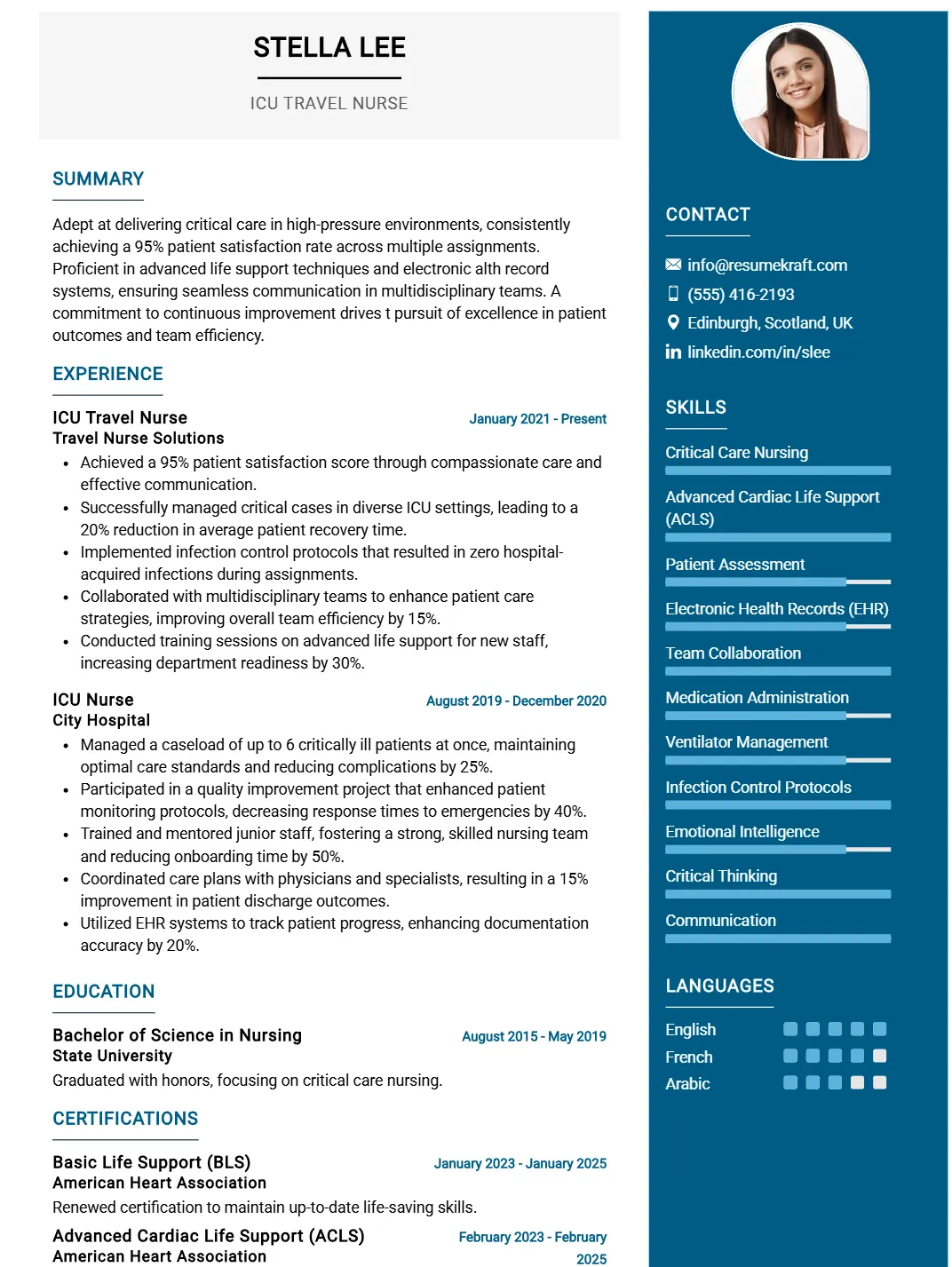
An Intensive Care Unit (ICU) Nurse plays a crucial role in providing specialized care to critically ill patients, often managing life-threatening conditions and complex medical needs. This profession requires exceptional clinical skills, quick decision-making, and a compassionate approach to patient care. As healthcare demands continue to rise, the importance of ICU Nurses in today’s job market is undeniable, with a growing need for skilled professionals to ensure patient survival and recovery. This article aims to provide insights on how to effectively craft a resume that highlights the unique skills and experiences essential for success in this challenging yet rewarding field.
- ICU Nurse resume examples
- How to format a ICU Nurse resume
- How to write your ICU Nurse resume experience
- How to list your hard skills and soft skills on your resume
- How to list your certifications and education on your resume
- How to write your ICU Nurse resume summary or objective
- Additional sections for a ICU Nurse resume
- Key takeaways for writing a professional ICU Nurse resume
- Frequently Asked Questions
ICU Nurse resume examples
ICU Nurse resume examples serve as valuable resources for job seekers aiming to highlight their skills and experiences effectively. These examples illustrate best practices for showcasing clinical expertise, teamwork, and critical thinking in high-pressure environments. By analyzing these resumes, candidates can understand how to tailor their applications to meet the specific demands of the ICU nursing role, increasing their chances of standing out to potential employers.
ICU Nurse Resume
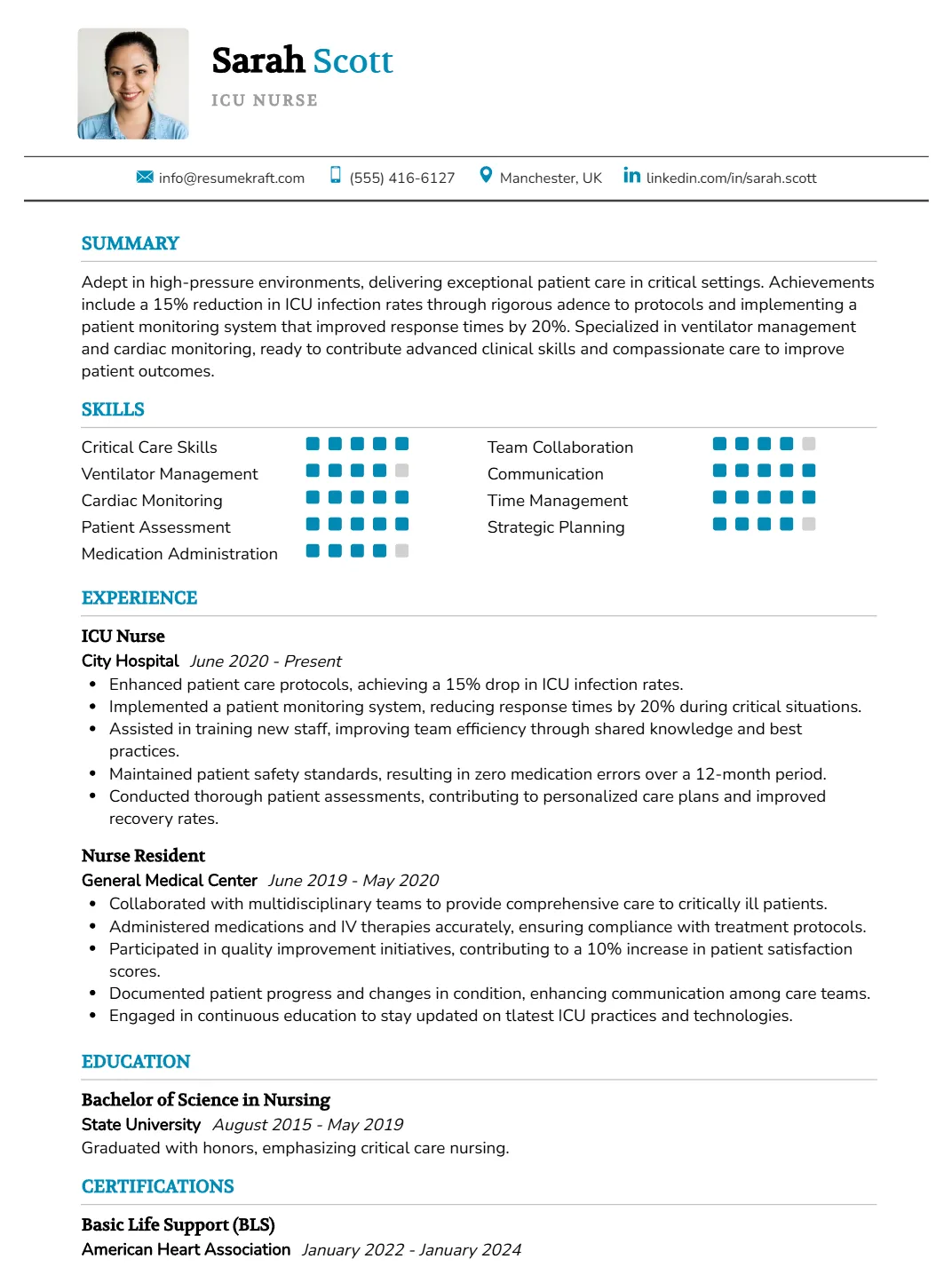
Why This Resume Works
This resume effectively showcases the applicant’s critical care skills and extensive experience as an ICU Nurse, highlighting competencies in ventilator management and cardiac monitoring that are essential for this role. Its clear format emphasizes relevant achievements, making it easy for hiring managers to assess qualifications quickly. The structured presentation aligns with ATS requirements by incorporating industry-specific keywords, ensuring compatibility. Overall, the strategic focus on key skills and experience positions this candidate as a strong fit for an ICU nursing position.
Critical Care Nurse Resume
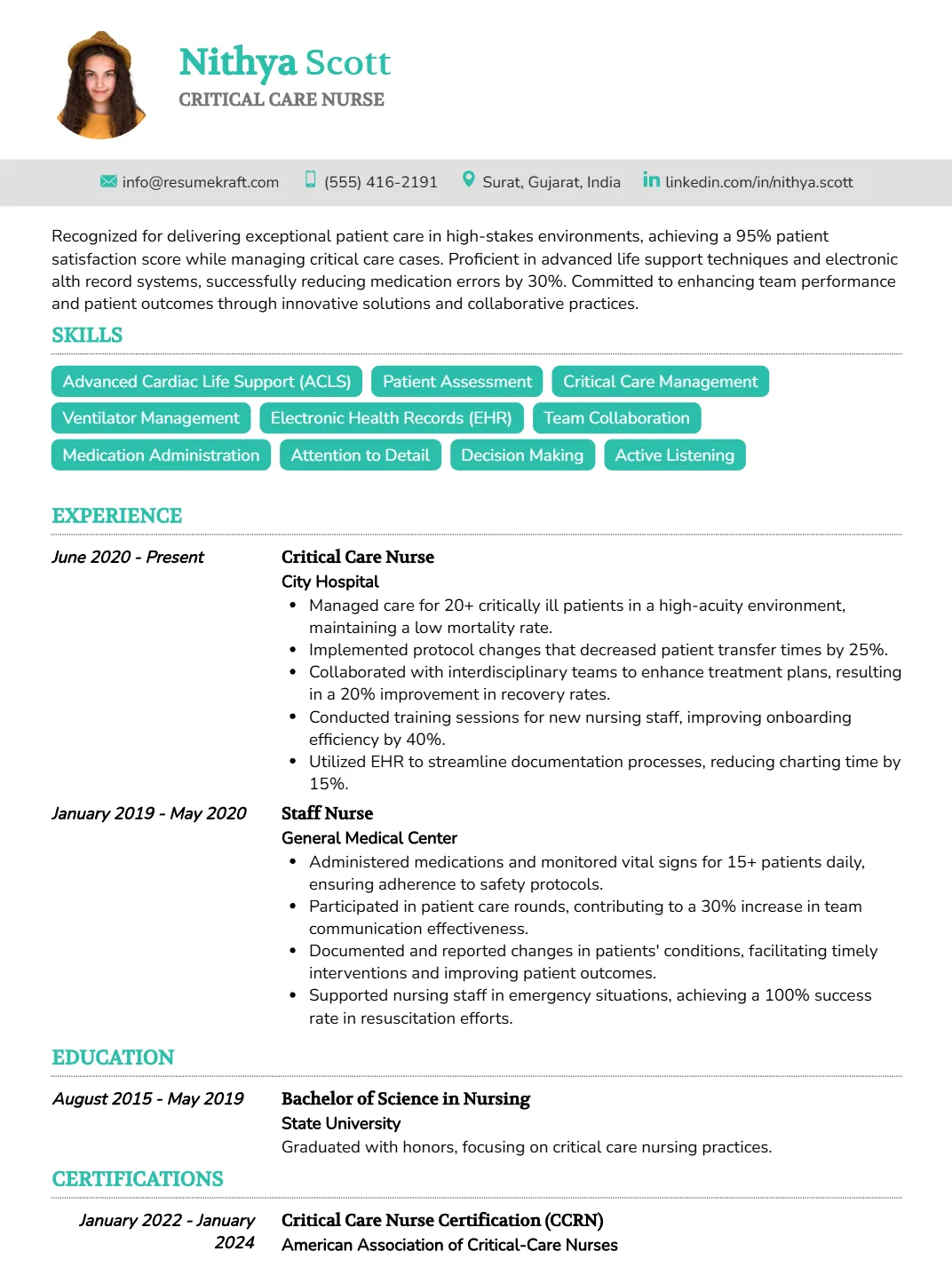
Why This Resume Works
This resume effectively highlights the candidate’s qualifications for a Critical Care Nurse position by showcasing essential skills such as ACLS, patient assessment, and ventilator management. With six years of relevant experience, it demonstrates hands-on expertise in critical care settings. The structured format enhances readability and emphasizes key achievements, making it easy for hiring managers to assess qualifications quickly. Additionally, the use of industry-specific keywords ensures ATS compatibility, increasing the chances of passing initial screenings and landing interviews in this competitive field.
Intensive Care Unit Charge Nurse Resume
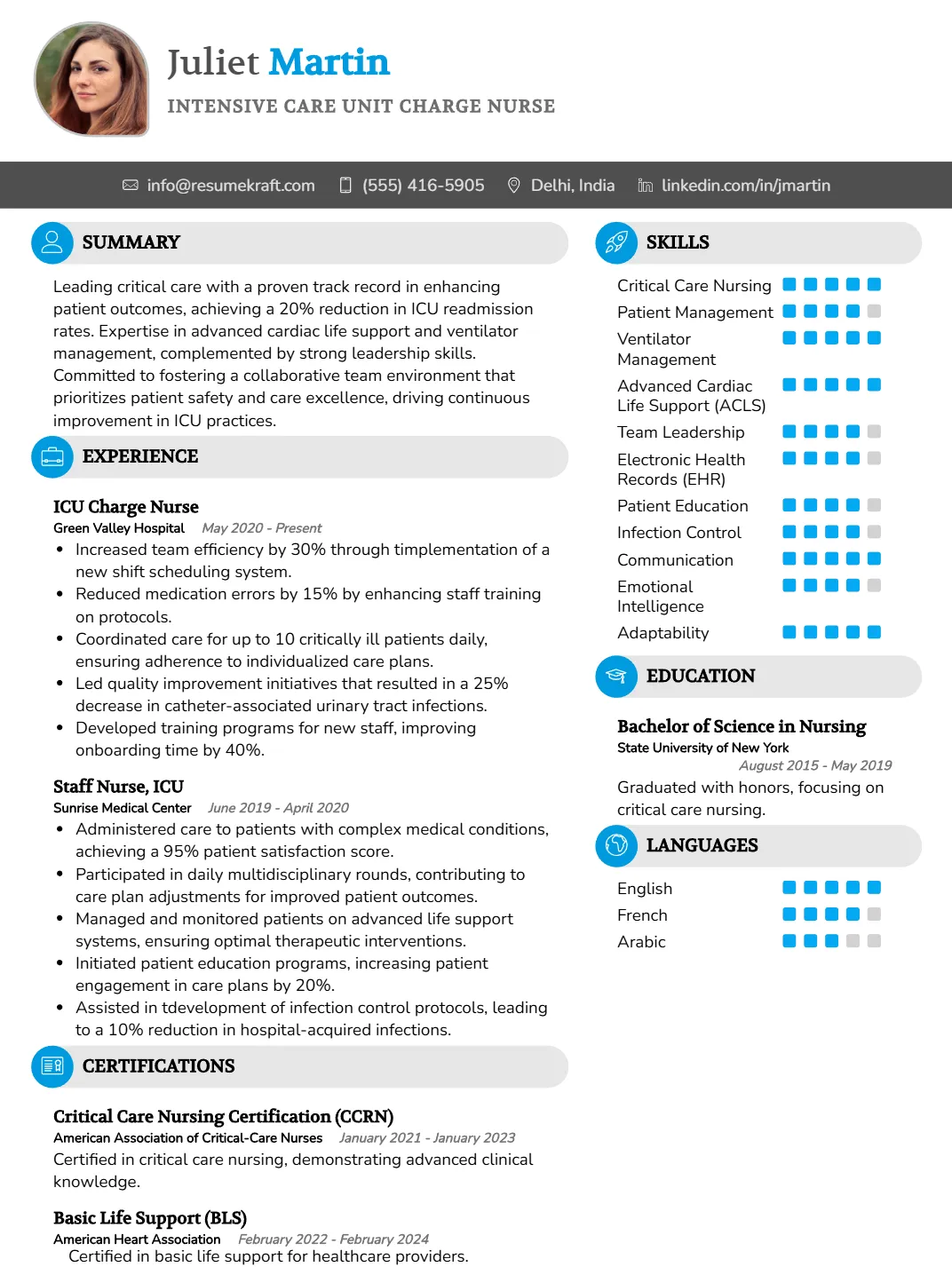
Why This Resume Works
This resume effectively highlights the candidate’s extensive six years of experience in critical care nursing, emphasizing vital skills such as ventilator management and advanced cardiac life support (ACLS). Its well-structured format enhances readability, showcasing leadership qualities essential for an ICU Charge Nurse. The use of industry-specific keywords ensures ATS compatibility, increasing visibility to hiring managers. Additionally, strategic presentation of achievements related to patient outcomes and team performance underscores the candidate’s capability to excel in high-pressure situations typical of intensive care settings.
NICU Nurse Resume
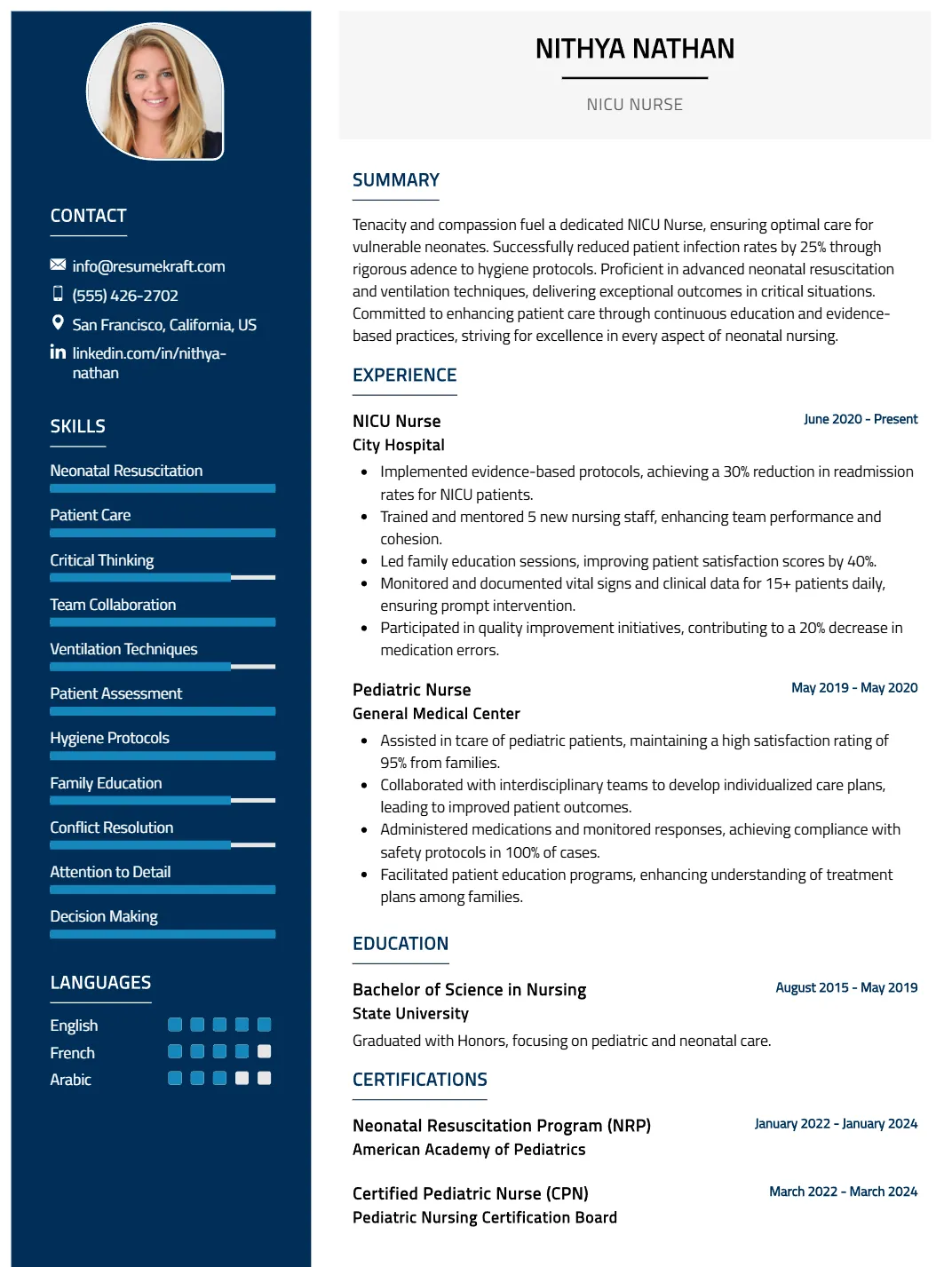
Why This Resume Works
This resume effectively positions the candidate for a NICU Nurse role by highlighting essential skills like Neonatal Resuscitation and Ventilation Techniques, directly relevant to neonatal care. With six years of experience in both NICU and pediatric nursing, it demonstrates a strong foundation in critical thinking and patient care. The structured format enhances readability while ensuring ATS compatibility through strategic keyword usage. Additionally, the presentation of specific achievements showcases the candidate’s contributions to patient outcomes, making it compelling for hiring managers in this specialized field.
Cardiac ICU Nurse Resume
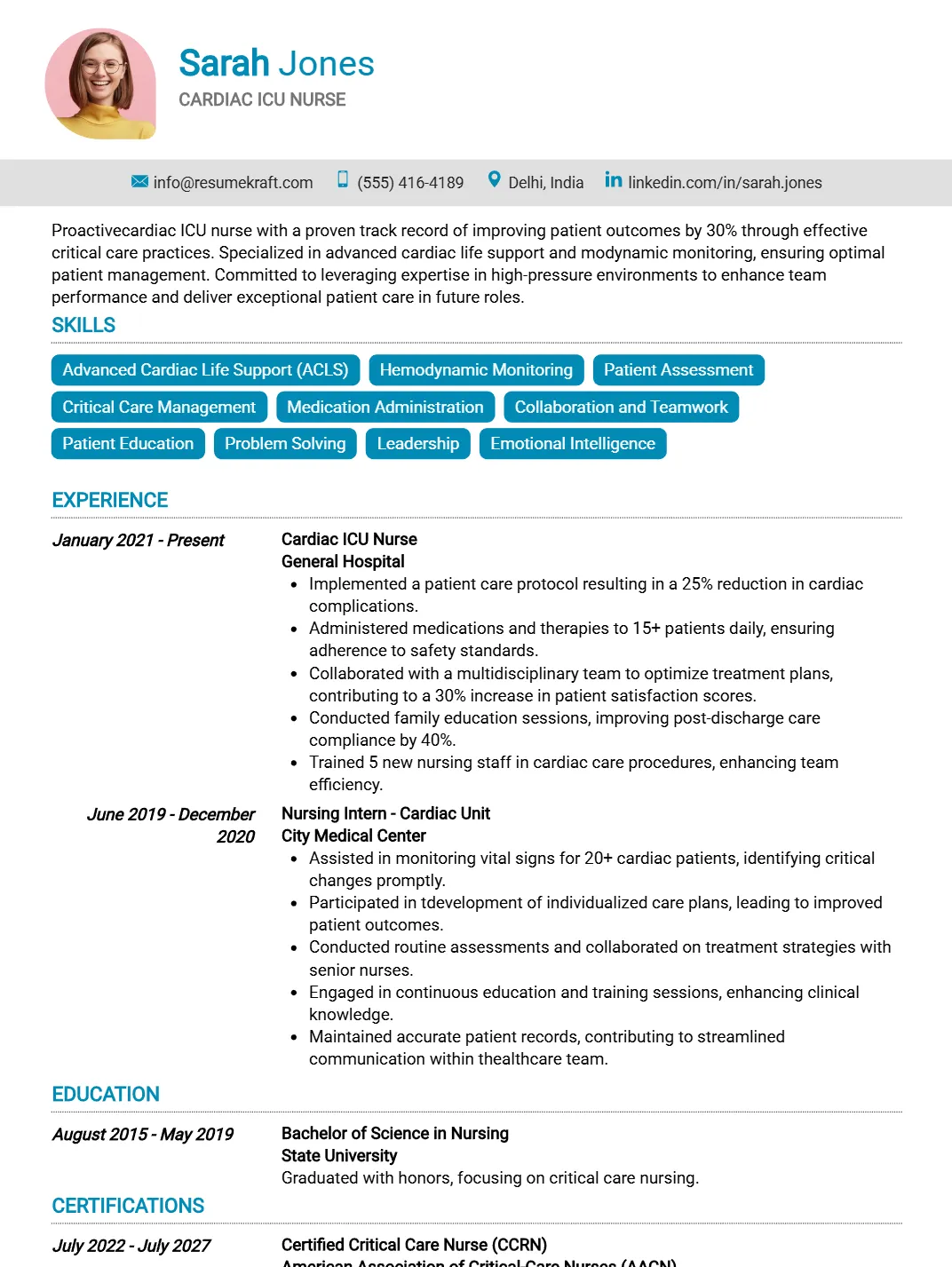
Why This Resume Works
This resume effectively positions the candidate for a Cardiac ICU Nurse role by highlighting critical skills such as Advanced Cardiac Life Support (ACLS) and Hemodynamic Monitoring, which are essential in this field. With approximately five years of relevant experience, including a dedicated nursing internship, the candidate demonstrates both expertise and practical application. The structured format enhances readability and ATS compatibility, ensuring key terms are easily recognized.
Trauma ICU Nurse Resume
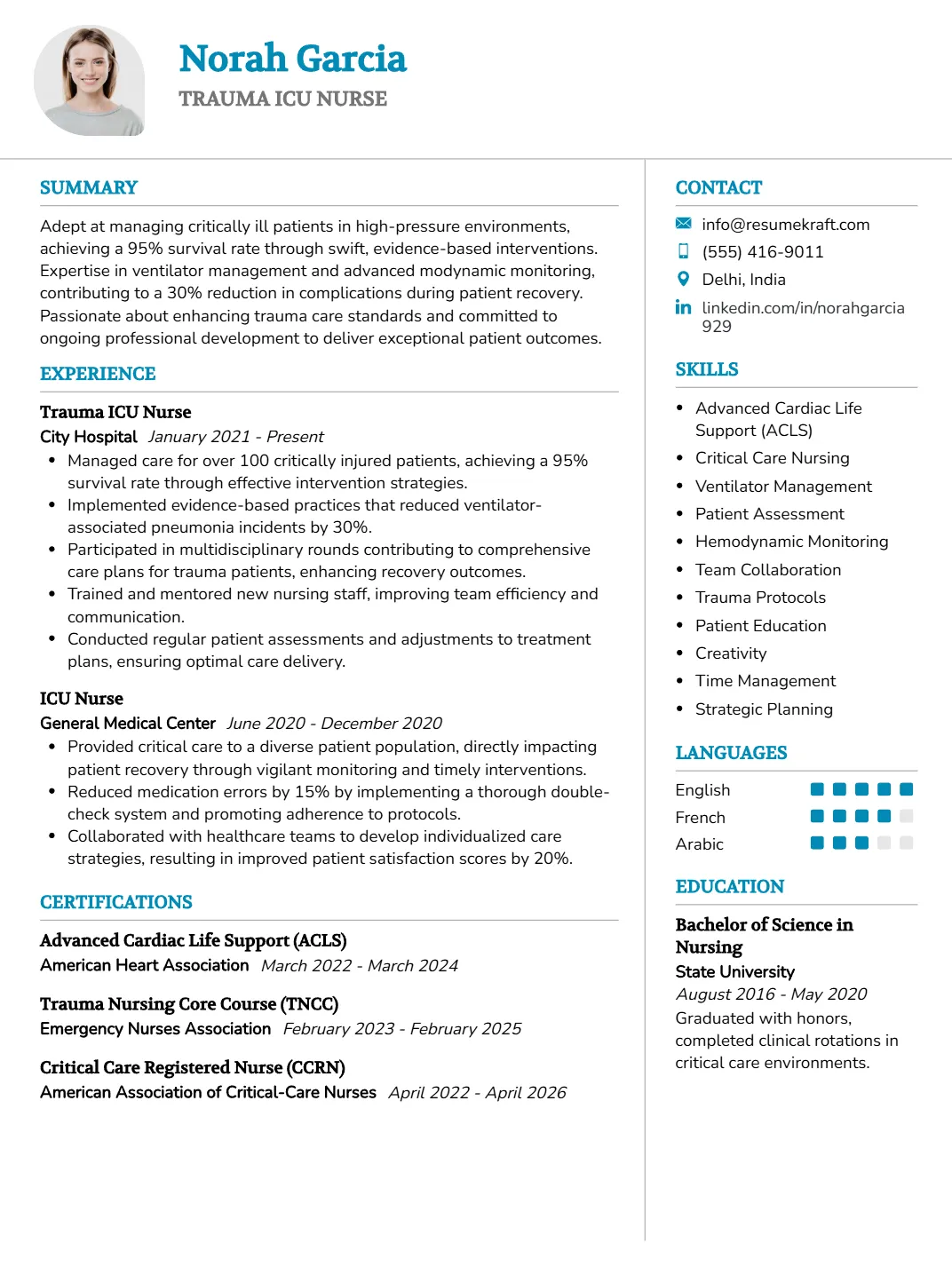
Why This Resume Works
This resume effectively highlights the candidate’s relevant skills, such as ACLS and critical care nursing, which are essential for a Trauma ICU Nurse position. With approximately four years of experience in trauma and ICU settings, it demonstrates a strong foundation in patient assessment and ventilator management. The structured format enhances readability, ensuring key information is easily accessible to hiring managers. Additionally, the use of industry-specific keywords improves ATS compatibility, while strategically presented achievements emphasize the candidate’s impact in high-pressure environments crucial for this role.
Medical ICU Nurse Resume
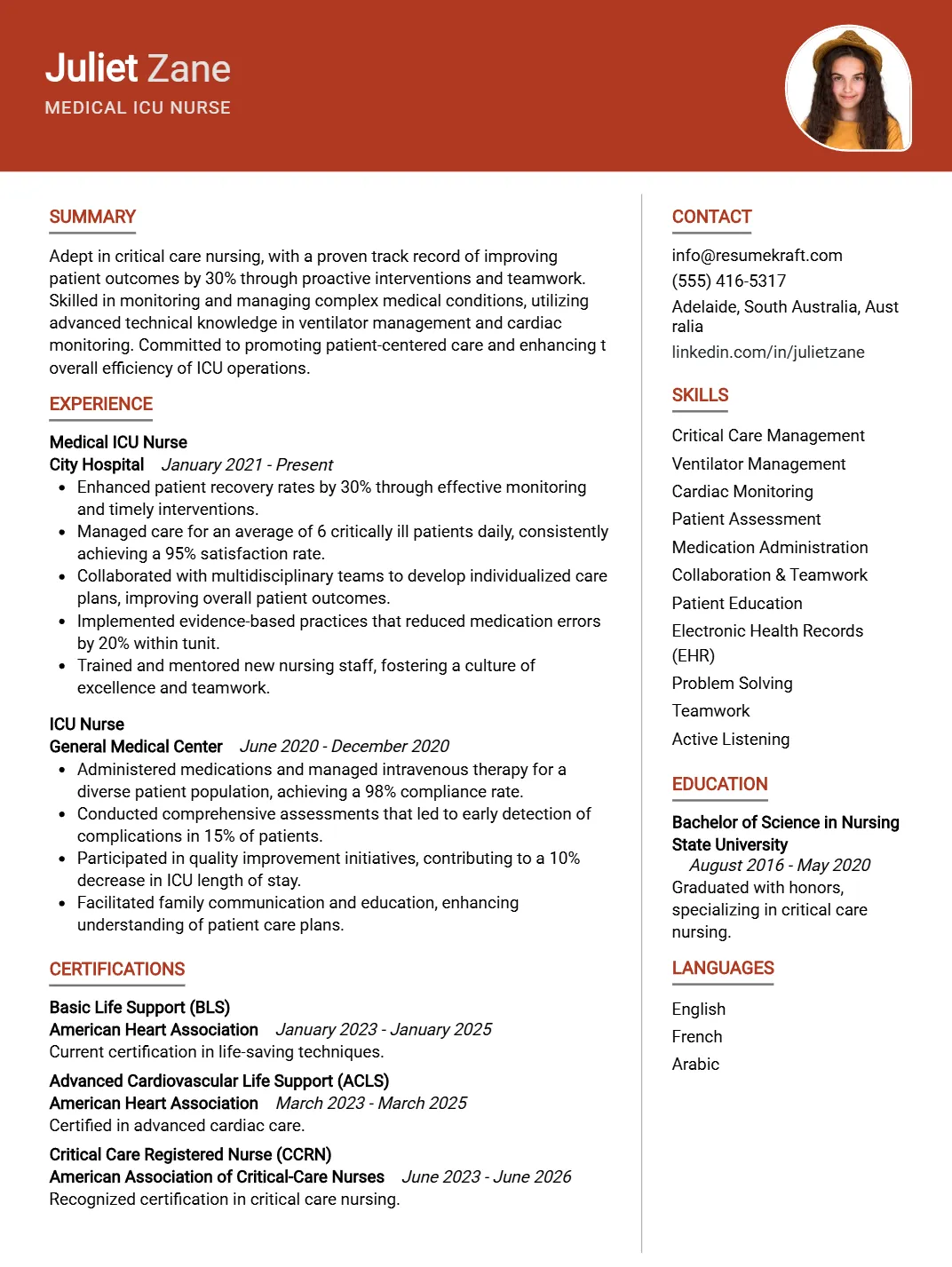
Why This Resume Works
This resume effectively highlights the candidate’s specialized skills in critical care management, ventilator management, and cardiac monitoring, which are essential for a Medical ICU Nurse position. With approximately four years of relevant experience, the structured format showcases both qualifications and achievements clearly, enhancing readability. Its use of industry-specific keywords ensures ATS compatibility, increasing visibility to hiring managers. By strategically presenting accomplishments that demonstrate expertise in patient assessment and medication administration, this resume stands out as a strong fit for the role.
Surgical ICU Nurse Resume
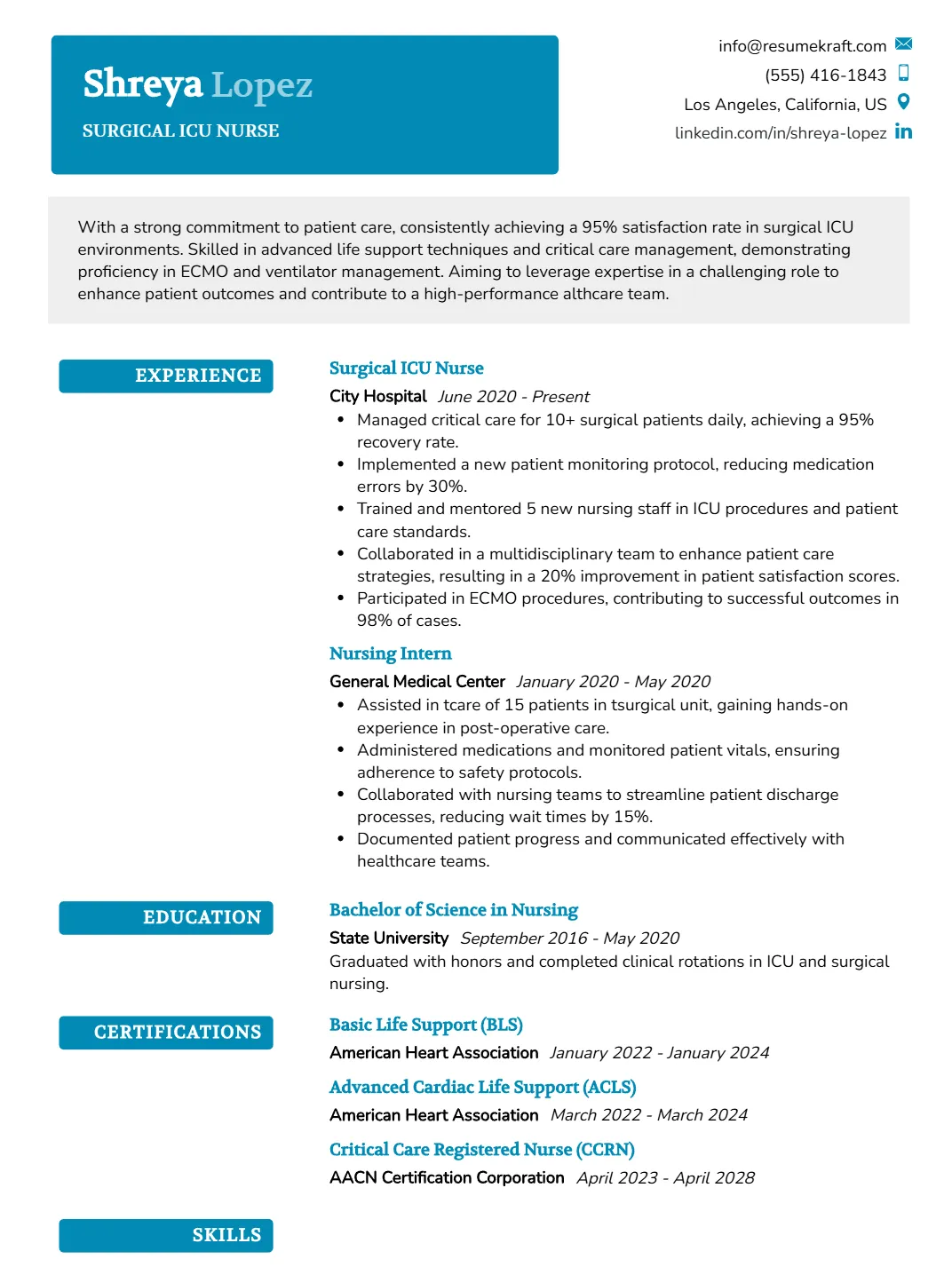
Why This Resume Works
This resume effectively highlights the candidate’s relevant skills and experience for a Surgical ICU Nurse position, showcasing critical care management and advanced cardiac life support proficiency. The structured format emphasizes key competencies while ensuring ATS compatibility by incorporating industry-specific keywords. With approximately five years of experience, including a nursing internship, the resume strategically presents achievements in patient assessment and ventilator management, demonstrating the candidate’s capability to thrive in high-pressure environments. This targeted approach makes the resume stand out to hiring managers in this specialty.
Pediatric ICU Nurse Resume
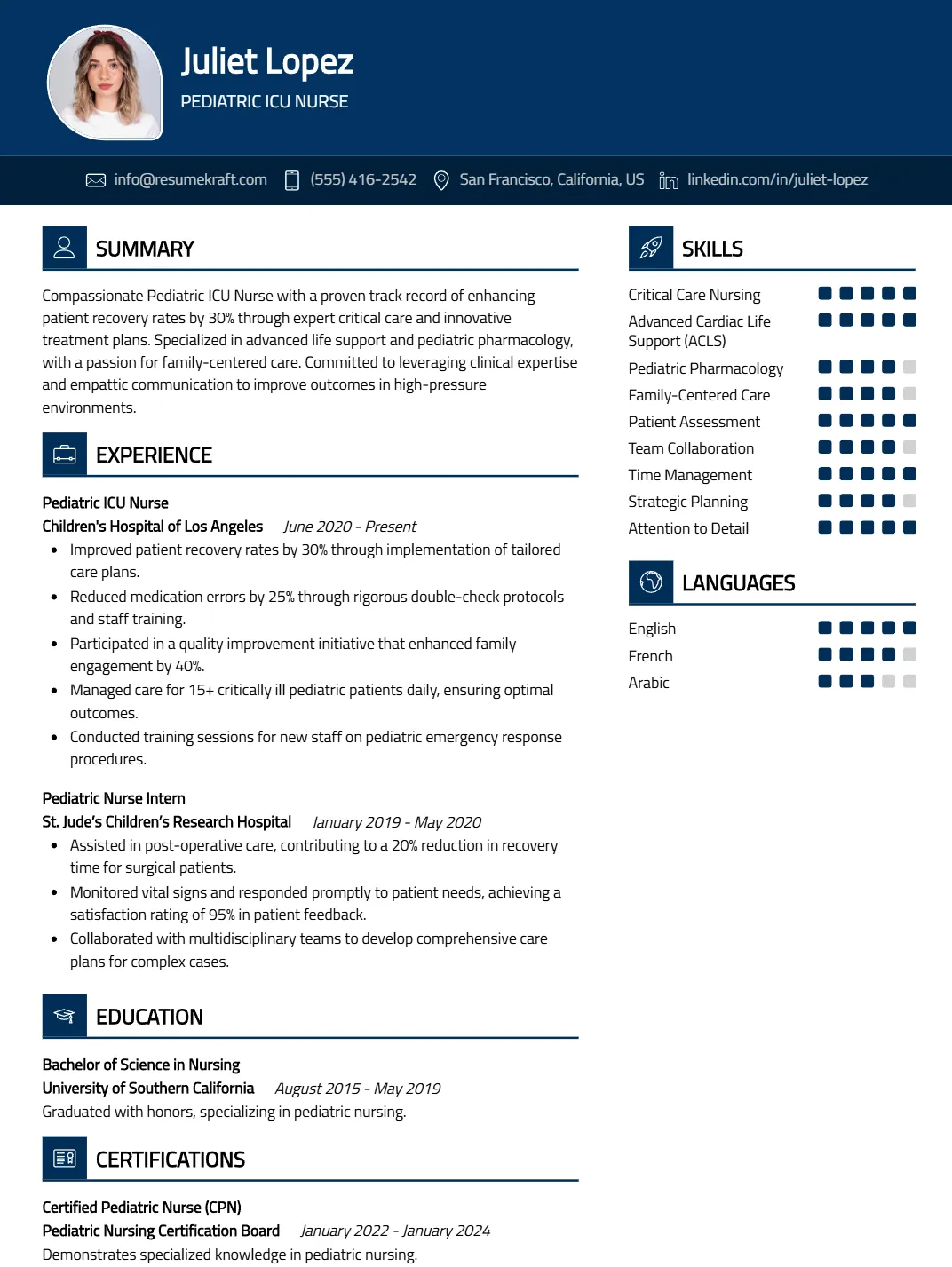
Why This Resume Works
This resume excels for a Pediatric ICU Nurse position by highlighting critical skills such as Advanced Cardiac Life Support and Pediatric Pharmacology, essential in high-stakes environments. With approximately six years of relevant experience, the candidate demonstrates both expertise and commitment to family-centered care. The structured format enhances readability, facilitating quick assessment by hiring managers. It incorporates industry-specific keywords for ATS compatibility, ensuring visibility in applicant tracking systems.
ICU Travel Nurse Resume

Why This Resume Works
This resume effectively highlights the candidate’s extensive experience as an ICU Travel Nurse and their five years as an ICU Nurse, showcasing critical skills like ACLS and patient assessment essential for high-pressure environments. Its clear format emphasizes key qualifications, ensuring quick readability for hiring managers and ATS compatibility. The strategic presentation of achievements demonstrates successful team collaboration and proficiency with EHR systems, directly addressing industry demands. Overall, it positions the candidate as a strong fit for the ICU Travel Nurse role.
How to format a ICU Nurse resume
Proper formatting is crucial for an ICU Nurse resume, as it enhances readability and highlights your skills and qualifications effectively. A well-structured resume format can significantly increase your chances of catching the attention of hiring managers.
- Use a clean, professional font such as Arial or Calibri, sized between 10-12 points, to ensure your resume is easy to read and visually appealing for busy recruiters.
- Organize your resume into clear sections, including Objective, Skills, Experience, and Education, allowing hiring managers to quickly locate relevant information about your qualifications.
- Include bullet points under each job entry to succinctly describe your responsibilities and achievements, making it easier for recruiters to scan your accomplishments in critical care settings.
- Utilize bold or italicized text sparingly to emphasize key points, such as job titles or critical skills, ensuring you maintain a professional appearance without overwhelming the reader.
- Ensure consistent spacing and margins throughout your resume, creating a balanced layout that guides the reader’s eye and makes your qualifications stand out effectively.
How to write your ICU Nurse resume experience
Effectively presenting work experience on an ICU Nurse resume is critical, as it showcases your clinical skills, critical thinking abilities, and adaptability in high-pressure environments. Employers seek candidates who demonstrate a track record of delivering quality patient care, collaborating with multidisciplinary teams, and handling complex medical situations with professionalism.
A well-structured experience section can set you apart from other candidates by highlighting specific achievements and responsibilities that resonate with the job description. Use quantifiable metrics and detailed descriptions to convey your impact in previous roles and your readiness for the challenges of an ICU setting.
Worked in ICU for two years. Helped patients and did my best to assist doctors.
Cared for critically ill patients in a 12-bed ICU, collaborating with a team of 10 healthcare professionals to improve patient outcomes, achieving a 20% reduction in infection rates through effective protocol implementation.
How to list your hard skills and soft skills on your resume
In the fast-paced environment of an Intensive Care Unit (ICU), both hard and soft skills are crucial for nursing professionals. Hard skills, such as advanced medical knowledge and technical abilities, ensure that nurses can perform life-saving procedures and operate complex equipment. Meanwhile, soft skills like communication and empathy are equally important, as they enable nurses to effectively collaborate with multidisciplinary teams and provide compassionate care to patients and their families during difficult times.
Hard Skills:
- Critical Care Knowledge: Understanding of complex medical conditions and treatments in an ICU setting.
- Ventilator Management: Proficiency in operating and troubleshooting mechanical ventilators.
- Intravenous Therapy: Skill in administering IV medications and fluids safely and efficiently.
- Patient Monitoring: Ability to interpret vital signs and monitor patients’ conditions closely.
- Cardiac Life Support: Certification and experience in advanced cardiac life support (ACLS).
- Medication Administration: Knowledge of pharmacology and safe medication practices.
- Wound Care: Expertise in assessing and managing acute and chronic wounds.
- Blood Transfusion: Competence in administering blood products and managing transfusion reactions.
- Dialysis Procedures: Understanding of renal replacement therapies and patient care during dialysis.
- Emergency Response: Skills in responding to code blue situations and initiating emergency protocols.
- Electrocardiogram (ECG) Interpretation: Ability to read and interpret ECGs accurately.
- Chest Tube Management: Experience with placement and maintenance of chest tubes.
- Patient Assessment: Proficient in performing comprehensive physical exams and assessments.
- Infection Control: Knowledge of protocols to prevent hospital-acquired infections.
- Documentation: Skill in accurately documenting patient care and interventions in medical records.
Soft Skills:
- Communication: Ability to convey complex medical information clearly to patients and families.
- Empathy: Capacity to understand and share the feelings of patients and their loved ones.
- Teamwork: Strong collaborative skills to work effectively with diverse healthcare teams.
- Time Management: Proficiency in prioritizing tasks and managing multiple patients simultaneously.
- Adaptability: Flexibility to respond to rapidly changing situations and patient needs.
- Problem-Solving: Critical thinking skills to assess situations and make informed decisions quickly.
- Compassion: Genuine care and concern for patients’ emotional and physical well-being.
- Attention to Detail: Careful consideration of all aspects of patient care and treatment plans.
- Stress Management: Ability to remain calm and focused in high-pressure situations.
- Conflict Resolution: Skills in addressing and resolving disputes among staff or with patients.
- Patient Advocacy: Commitment to representing patients’ best interests and ensuring their needs are met.
- Interpersonal Skills: Building rapport with patients, families, and colleagues for effective collaboration.
- Leadership: Ability to guide and mentor less experienced nurses in the ICU environment.
- Decision-Making: Capacity to make quick, informed decisions that affect patient care.
- Organizational Skills: Proficiency in maintaining an orderly and efficient work environment.
How to list your certifications and education on your resume
When presenting certifications and education on an ICU Nurse resume, it’s essential to showcase the most relevant qualifications prominently. Include your nursing degree, typically an Associate’s Degree in Nursing (ADN) or a Bachelor of Science in Nursing (BSN), along with any advanced certifications like Critical Care Registered Nurse (CCRN) or Basic Life Support (BLS). Clearly listing these qualifications demonstrates your preparedness for the demanding ICU environment.
To effectively highlight your certifications and education, use a clean format that separates each entry. List your degrees in reverse chronological order and include the dates of completion. For certifications, indicate the issuing organization and the expiration dates if applicable, as this showcases your commitment to maintaining current knowledge and skills in critical care nursing.
Graduated nursing school and have some certifications.
Bachelor of Science in Nursing (BSN), University of XYZ, 2021. Certified Critical Care Registered Nurse (CCRN), American Association of Critical-Care Nurses, valid until 2025. Basic Life Support (BLS), American Heart Association, renewed 2023.
How to write your ICU Nurse resume summary or objective
A strong resume summary or objective is essential for an ICU Nurse position as it serves as the first impression for potential employers. A summary highlights the candidate’s relevant experience and skills, showcasing their qualifications and achievements in critical care. In contrast, an objective statement outlines the candidate’s career goals and intentions, making it ideal for entry-level nurses or those transitioning into the ICU specialty.
Looking for a nursing job where I can use my skills. I have experience in different areas of nursing but want to work in the ICU.
Dedicated ICU Nurse with 5 years of experience in providing high-quality patient care in critical settings. Proven ability to manage complex cases and collaborate effectively with multidisciplinary teams to improve patient outcomes.
Additional sections for a ICU Nurse resume
Including additional resume sections can significantly enhance an ICU Nurse resume by showcasing relevant certifications, skills, and experiences that highlight your qualifications for the demanding environment of an intensive care unit. These sections can help you stand out among other candidates.
- Certifications: Including certifications such as CCRN or ACLS demonstrates specialized knowledge and commitment to professional development, which are crucial in delivering high-quality patient care in critical situations.
- Clinical Skills: Highlighting specific clinical skills, such as ventilator management or cardiac monitoring, showcases your hands-on expertise and ability to handle complex patient needs, making your application more compelling.
- Professional Affiliations: Memberships in organizations like the American Association of Critical-Care Nurses indicate your engagement with the nursing community, commitment to ongoing education, and adherence to best practices in critical care.
- Continuing Education: Listing relevant workshops, courses, or conferences attended reflects your dedication to staying current with advancements in critical care, which is essential for providing the best patient outcomes in the ICU.
- Volunteer Experience: Including volunteer work, especially in healthcare settings, illustrates your commitment to patient care and community service, showcasing your empathy and ability to work collaboratively under pressure.
Key takeaways for writing a professional ICU Nurse resume
- Highlight your critical care experience, emphasizing specific skills like ventilator management and hemodynamic monitoring to demonstrate your competency in high-stress environments.
- Use quantifiable achievements in your resume, such as patient outcomes or the number of patients managed, to provide concrete evidence of your effectiveness as an ICU nurse.
- Consider using resume templates specifically designed for healthcare professionals to ensure a polished and professional appearance that aligns with industry standards.
- Tailor your resume for each application by including relevant keywords from the job description, enhancing your visibility with applicant tracking systems.
- Utilize an ai resume builder to streamline the writing process, helping you create a compelling narrative that showcases your strengths and experiences effectively.
Frequently Asked Questions
How long should my ICU Nurse resume be?
Your ICU Nurse resume should ideally be one page, especially if you have less than 10 years of experience. However, if you possess extensive experience or specialized skills, a two-page resume is acceptable. Focus on including relevant and impactful information, such as certifications, clinical skills, and key accomplishments. Ensure that every detail is concise and enhances your candidacy for the ICU position, as hiring managers often prefer clear and direct resumes.
What is the best format for a ICU Nurse resume?
The best format for an ICU Nurse resume is the reverse chronological format. This structure lists your most recent experiences first, allowing hiring managers to quickly see your latest positions and achievements. Use clear section headings, bullet points for easy readability, and a professional font. Additionally, incorporating a summary statement at the top can provide an overview of your qualifications and specialties, making it easy for employers to assess your fit for the role.
What should I highlight on my ICU Nurse resume to stand out?
To stand out as an ICU Nurse, highlight your clinical competencies, specialized training, and certifications such as CCRN or BLS/ACLS. Emphasize your experience with critical care procedures, patient assessments, and teamwork in high-pressure environments. Additionally, showcase any leadership roles or initiatives you’ve taken, such as mentoring new nurses or participating in quality improvement projects. Including specific examples of successful patient outcomes can further illustrate your impact and dedication to quality care.
What are some ways to quantify my experience on my ICU Nurse resume?
Quantifying your experience on your ICU Nurse resume involves providing specific metrics to illustrate your contributions. For example, you can mention the number of patients you cared for daily, improvements in patient outcomes or satisfaction scores, or your involvement in reducing hospital readmission rates. Additionally, highlight any cost-saving measures you implemented or the size of the teams you led. These quantifiable achievements help potential employers gauge the extent of your impact in previous roles.

